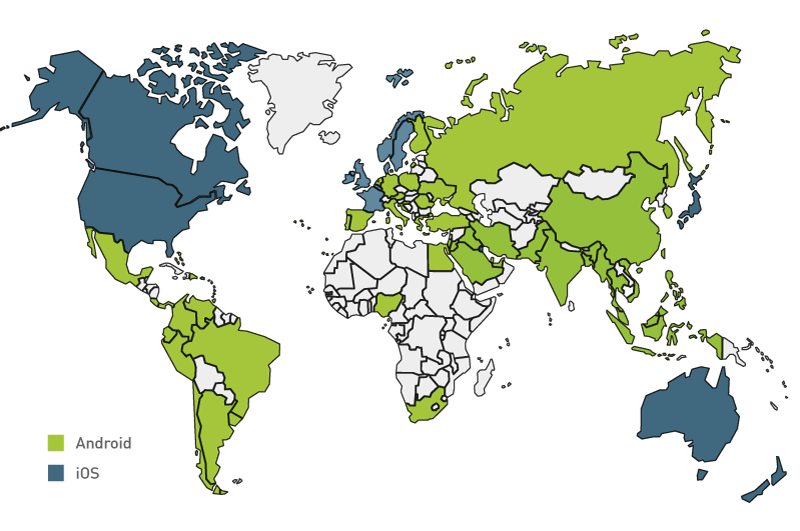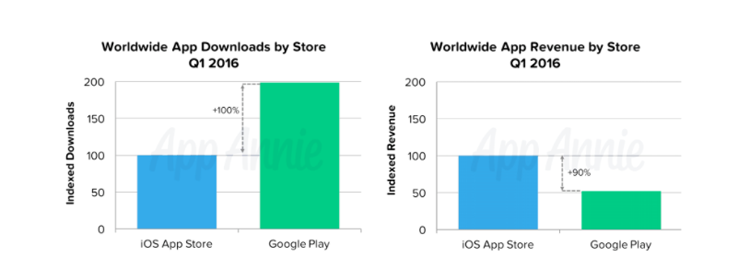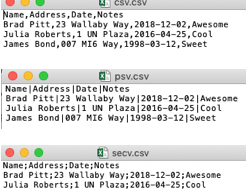Deciding whether to build a business app for Android or iOS (Apple) depends on 5 factors: your audience, project timeline, desired app features, app maintenance budget, and revenue goal. We compiled statistics on these factors to help you choose ? android vs iOS.

If you?re building an app, developing for iOS or Android is one of the first decisions you need to make.
While your goal may be to launch on both platforms eventually, it is risky and expensive to build an app for both iOS and Android simultaneously.
Instead, most developers choose to build an app for one platform to start and then launch the app on the other platform later ? once the first version of the app is established and successful.
How do you decide whether to launch your app on Android or iOS first?
There are pros and cons to both platforms, but ultimately, the choice comes down to 5 factors:
- Audience
- Timeline
- Desired features
- Budget for maintaining your app
- Revenue goal
Building an App for Android or iOS Depends on Your Audience
There are key differences in the users Android and iOS attract.
For example, Android devices have the greatest global market share. However, Apple dominates the App Store for customer spending.
Consider your target audience?s geographic and demographic characteristics when deciding which platform to develop for first.
If you?re targeting a broad global audience, Android may be your best bet.
 Source: App Annie
Source: App Annie
If your audience is in Western Europe or North America, or if you?re an e-commerce or enterprise app, Apple may be a better choice.
Android Best for Audience in Up-And-Coming Markets
- Android is dominant in global up-and-coming markets, including in Asia, Africa, and Latin America.
- Android users are more likely to work in technical jobs.
- Slightly more men prefer Android than iOS.
iOS Best for Affluent, Young Audience in Western Europe, Australia, North America
- iPhone users tend to be more affluent, earning 40% more than the average Android user.
- iOS users tend to be younger, with a greater share of the 18?24-year-old market.
- Women are more likely to use iPhones than Android.
- Apple users are more likely to have higher education degrees.
- Apple users tend to be in professional and managerial jobs.
- iOS has more penetration in the enterprise market, thanks to a reputation for better security.
- iOS leads in Western Europe, Australia, and North America.
- Apple users tend to be more engaged with their devices and spend more on apps.
- iOS users are more likely to shop and make purchases using their mobile devices.
Making an App for iOS is Faster and Less Expensive
It?s faster, easier, and cheaper to develop for iOS ? some estimates put development time at 30?40% longer for Android.
One reason why iOS is easier to develop for is the code. Android apps are generally written in Java, a language that involves writing more code than Swift, Apple?s official programming language.
Another reason is that Android is an open source platform. A lack of standardization means more devices, components, and software fragmentation to account for.
Apple?s closed ecosystem means you?re developing for a few standardized devices and operating systems.
That said, the Apple App Store has stricter rules and quality expectations and a longer review process, so it may take longer for apps to be approved. Your app may even be rejected if it?s not up to Apple?s standards.
Developing an App for Android Allows More Flexibility With Features
What features will you offer through your business app? Because Android is open source, there?s more flexibility to customize your app ? building the features and functions that your audience wants.
Of course, this open environment means Android is more susceptible to pirate apps and malware.
Apple is generally perceived as being more secure, due to its closed nature, which is largely why iOS has a larger audience in the enterprise market.
Maintaining App on Android or iOS Is Easier If Users Update OS
Developing for Android may mean spending more time ensuring that your app remains compatible with the platform and avoiding bugs and crashes for users running older operating systems.
Android users are slower to adopt new operating systems. One study found over 50% of Android users were running an operating system more than 2 years old.
Apple users are more likely to update their operating system.
Monetizing Your App Depends on Likelihood of Making Purchases on iOS or Android
If app monetization is one of your goals, there are some key platform differences to be aware of.
Android users tend to be less willing to pay for apps than iOS users, so free apps with in-app ads are more common.
In fact, the Apple App Store generates twice as much revenue as Google Play, despite having half as many downloads.
 Source: App Annie
Source: App Annie
Some other key app monetization differences include the following:
- Apple users are more likely to make in-app purchases and spend more on them.
- Apple users are more likely to pay for apps, except in one category ? utility apps. Android outperforms when it comes to utility apps.
- Shopping apps generate the most revenue, and North America leads in sales.
- Asian users spend 40% more on in-app purchases, and China is the biggest driver of iOS revenue.
- Both Google and Apple are pushing subscriptions and offering developers a larger cut of the revenue.
The takeaway: If you want to monetize your app without ads, whether through subscriptions, freemium models, or in-app purchases, then Apple may be your best bet. The same applies to e-commerce apps.
However, revenue from Android apps is growing. Though Apple is expected to remain the dominant App Store, Google Play and third-party Android stores combined are expected to overtake the App Store in terms of revenue.
Learn 5 other app monetization models you can use to make money with your business app.
Android vs Apple: Choose One Platform to Develop for First
Where your audience lives, who they are, the features they want, and your development timeline and budget determine whether you should build a business app for Android or iOS first.
If you need to build a minimum viable product quickly and cheaply, then iOS may be the way to go.
Similarly, if you have want to make money with your app or build an e-commerce app, look to iOS.
However, if you?re targeting global or emerging markets, especially in Asia and Latin America, or if your app involves features that Apple doesn?t support, then Android is your best bet.
Whichever platform you choose, once you?ve worked out the kinks and built a user base on your initial platform, you may find that users on the other platform begin clamoring for a version of your app.
When this happens, it?s a sign that it?s time to build another version of your app for the other platform.
Need help finding an Android or iOS app developer? We create shortlists of the top 15 developers for each platform to help you find the best match:
- Top iPhone and iOS Developers in 2018
- Top Android App Developers 2018
This article was published on The Manifest on February 22, 2018 and was written by Ashley MacQuarrie.

